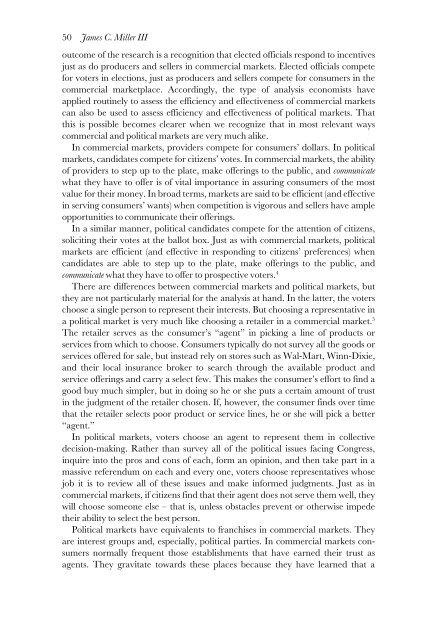Money and Markets: Essays in Honor of Leland B. Yeager
Money and Markets: Essays in Honor of Leland B. Yeager
Money and Markets: Essays in Honor of Leland B. Yeager
Create successful ePaper yourself
Turn your PDF publications into a flip-book with our unique Google optimized e-Paper software.
50 James C. Miller IIIoutcome <strong>of</strong> the research is a recognition that elected <strong>of</strong>ficials respond to <strong>in</strong>centivesjust as do producers <strong>and</strong> sellers <strong>in</strong> commercial markets. Elected <strong>of</strong>ficials competefor voters <strong>in</strong> elections, just as producers <strong>and</strong> sellers compete for consumers <strong>in</strong> thecommercial marketplace. Accord<strong>in</strong>gly, the type <strong>of</strong> analysis economists haveapplied rout<strong>in</strong>ely to assess the efficiency <strong>and</strong> effectiveness <strong>of</strong> commercial marketscan also be used to assess efficiency <strong>and</strong> effectiveness <strong>of</strong> political markets. Thatthis is possible becomes clearer when we recognize that <strong>in</strong> most relevant wayscommercial <strong>and</strong> political markets are very much alike.In commercial markets, providers compete for consumers’ dollars. In politicalmarkets, c<strong>and</strong>idates compete for citizens’ votes. In commercial markets, the ability<strong>of</strong> providers to step up to the plate, make <strong>of</strong>fer<strong>in</strong>gs to the public, <strong>and</strong> communicatewhat they have to <strong>of</strong>fer is <strong>of</strong> vital importance <strong>in</strong> assur<strong>in</strong>g consumers <strong>of</strong> the mostvalue for their money. In broad terms, markets are said to be efficient (<strong>and</strong> effective<strong>in</strong> serv<strong>in</strong>g consumers’ wants) when competition is vigorous <strong>and</strong> sellers have ampleopportunities to communicate their <strong>of</strong>fer<strong>in</strong>gs.In a similar manner, political c<strong>and</strong>idates compete for the attention <strong>of</strong> citizens,solicit<strong>in</strong>g their votes at the ballot box. Just as with commercial markets, politicalmarkets are efficient (<strong>and</strong> effective <strong>in</strong> respond<strong>in</strong>g to citizens’ preferences) whenc<strong>and</strong>idates are able to step up to the plate, make <strong>of</strong>fer<strong>in</strong>gs to the public, <strong>and</strong>communicate what they have to <strong>of</strong>fer to prospective voters. 4There are differences between commercial markets <strong>and</strong> political markets, butthey are not particularly material for the analysis at h<strong>and</strong>. In the latter, the voterschoose a s<strong>in</strong>gle person to represent their <strong>in</strong>terests. But choos<strong>in</strong>g a representative <strong>in</strong>a political market is very much like choos<strong>in</strong>g a retailer <strong>in</strong> a commercial market. 5The retailer serves as the consumer’s “agent” <strong>in</strong> pick<strong>in</strong>g a l<strong>in</strong>e <strong>of</strong> products orservices from which to choose. Consumers typically do not survey all the goods orservices <strong>of</strong>fered for sale, but <strong>in</strong>stead rely on stores such as Wal-Mart, W<strong>in</strong>n-Dixie,<strong>and</strong> their local <strong>in</strong>surance broker to search through the available product <strong>and</strong>service <strong>of</strong>fer<strong>in</strong>gs <strong>and</strong> carry a select few. This makes the consumer’s effort to f<strong>in</strong>d agood buy much simpler, but <strong>in</strong> do<strong>in</strong>g so he or she puts a certa<strong>in</strong> amount <strong>of</strong> trust<strong>in</strong> the judgment <strong>of</strong> the retailer chosen. If, however, the consumer f<strong>in</strong>ds over timethat the retailer selects poor product or service l<strong>in</strong>es, he or she will pick a better“agent.”In political markets, voters choose an agent to represent them <strong>in</strong> collectivedecision-mak<strong>in</strong>g. Rather than survey all <strong>of</strong> the political issues fac<strong>in</strong>g Congress,<strong>in</strong>quire <strong>in</strong>to the pros <strong>and</strong> cons <strong>of</strong> each, form an op<strong>in</strong>ion, <strong>and</strong> then take part <strong>in</strong> amassive referendum on each <strong>and</strong> every one, voters choose representatives whosejob it is to review all <strong>of</strong> these issues <strong>and</strong> make <strong>in</strong>formed judgments. Just as <strong>in</strong>commercial markets, if citizens f<strong>in</strong>d that their agent does not serve them well, theywill choose someone else – that is, unless obstacles prevent or otherwise impedetheir ability to select the best person.Political markets have equivalents to franchises <strong>in</strong> commercial markets. Theyare <strong>in</strong>terest groups <strong>and</strong>, especially, political parties. In commercial markets consumersnormally frequent those establishments that have earned their trust asagents. They gravitate towards these places because they have learned that a
















